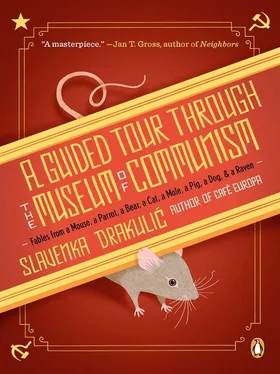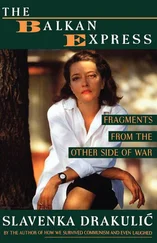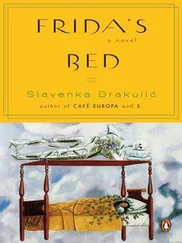Slavenka Drakulić
A GUIDED TOUR THROUGH THE MUSEUM OF COMMUNISM
FABLES FROM A MOUSE, A PARROT, A BEAR, A CAT, A MOLE, A PIG, A DOG, AND A RAVEN
In memory of my long-gone canine friends,
Poli, Kiki, and Charlie
Who controls the past controls the future. Who controls the present controls the past.
—GEORGE ORWELL
Iwould like to thank the Fischer Foundation in Germany for their generous grant, which enabled me to work on this book. My thanks to the IWM—the Institute for Human Sciences in Vienna, and to their anonymous friend who financed my Milena Jesenská grant in 2008.
Special thanks for her help with the U.S. edition to Professor Marci Shore from Yale University, to Janos M. Kovacs from IWM for his help with the Hungarian story, to my Albanian colleague, writer Bashkim Shehu, for helping me with the story about Albania, and to Claudia Ciobanu, for her help with the Romanian story.
I am grateful to Rujana for her inspiration, to Andi for his enthusiasm and to Richard for his improvements—as well as to my dear friends for their trust and support.
A SHORT NOTE TO THE READER
Iam aware that, if you are not familiar with Eastern Europe under Communism, some stories from this book might appear to you highly fictitious, if not outright fantasy. Therefore, I would like to assure you that, unfortunately, this is not the case. From the point of view of persons and events described, regardless of whether a story is narrated by a dog, a cat, or some other domestic, wild, or exotic animal, it all really happened. This is easy enough to check. Indeed, as a fiction writer I often felt shamed by the imagination of politicians, of which there is ample proof in this book!
However, writing again and again about the rule of Communism and its consequences for ordinary people, I came to the conclusion that we did not have “too much history,” as it is often said about this part of the world. Rather, we had too much memory and too many myths. And, in my life experience, this is a dangerous combination that has often resulted in ideology and manipulation leading to conflict and terrible suffering.
I
A GUIDED TOUR THROUGH THE MUSEUM OF COMMUNISM
Come in, come in, please! Don’t worry, this is only a museum of Communism, not the real thing!
I am joking. But do come in, please. You are Hans, from Würzburg, I presume? I was expecting you. I am Bohumil, your distant relative. I live in this Prague museum in a school cabinet, among the old textbooks. It suits me. I am a bookish type, a book mouse, one could say, ha-ha! Some time ago my grammar school became a private university and the classrooms were refurbished. My cabinet was thrown out. I thought that would be the end of my comfortable life. But luckily, some people from the museum came along and brought the cabinet here, as an exhibit from the old times.
I share my days with Milena, an elderly cleaning woman who also sells souvenirs in the museum shop. She pretends that she doesn’t know that I live here. But why then, I ask you, did she try to kill me with her broom the very first time she saw me, an ordinary little mouse? Well, not kill perhaps, but scare me off. As I had no other place to go, she reconciled herself to my existence. Perhaps she thought that, after all, I am an underdog just like her? Now she leaves crumbs of bread and pieces of apple and cheese near my cabinet every evening before she leaves. Often, when we are alone, she is talking to me. She calls me Bohumil! She says, “You know, Bohumil, what happened to me today?”—and then goes on with her story. I usually stand on the windowsill and listen to her, keep her company. It took me some time to understand that since there is nobody around, Bohumil is—well, me!
She went out to smoke a cigarette now; she won’t be back for a while. The only thing I hold against Milena is that she’s a heavy smoker, even though it’s bad for her health. And for mine, too. In fact, I discovered that I have an allergy to cigarettes. Although she often opens a window to the courtyard to let out the smelly air. It’s an old habit from when she used to work in the state archive as a secretary. Not as a cleaner, mind you. Milena studied English and French. Speaking of air, she says that any institution that has anything to do with the Communist state, even this one, smells of dust. Perhaps from too many papers, documents about God knows what and God knows whom… Milena used to worry, you know, if her husband was registered in the files of the secret police. Of course he was registered! Like, he was a “security risk”! “Any state that has to depend on police reports about citizens like him, just an ordinary engineer in an electrical plant, is pathetic!,” she used to say to her friend Dáša, a cleaning woman from the casino downstairs. But obviously, this is how it was; every citizen was considered to be a “security risk” back then. However, in the new democracy, because of so-called privatization , her Marek lost his job. That’s why she works here; they need the money.
I cannot say that I mind living in this museum, although it was really more interesting living in the grammar school. I learned a lot about Communism by listening to the lectures of a history teacher there. Perlík was his name. I heard that he was also a poet, a kind of dissident intellectual, and that he even spent some time in jail when he was young.
You don’t have such a museum in Würzburg, you say, and your knowledge of Communism is almost nonexistent. Well, since you are here in Prague as a tourist, I could show you around. I consider myself qualified to be a guide here, but the sad truth is that the museum would not employ a mouse. I can tell you that the more time I spend here, the more I realize how important this museum is. I remember Professor Perlík’s words that the time would soon come when kids would say: Communism, what’s that ? A religion? A maker of cars perhaps? And from what I heard from him, this is simply not right, Communism shouldn’t be remembered just by the likes of the professor or Milena, who survived it. It should be remembered for its bad sides and good; there must have been something good one can say about it, although that’s not a popular view to hold these days, I gather. For example, people could get a solid education, they say. Or there’s the fact that the Communist USSR fought against the Nazis in the Second World War. Yet Milena says that watching Hollywood movies one gets the impression that it was the Americans who won it all on their own!
No, life under Communism should not be forgotten, although that is exactly what I see happening. In this museum shop, by the way, you can buy a history book about the dark past for only five euros. It’s cheap. And it is only a hundred pages long, in large print. “The older I get, the more I appreciate it,” says Milena. You can read here, for example (I heard someone reading it with my own ears!), that the wife of President Klement Gottwald was rather fat, or that the wife of Antonín Novotný (the man who later became president himself) took the china and the bedsheets from the flat of Vladimír Clementis. Of course, only after he was executed in the purges of the fifties. You can also learn—as I did—that 257,964 people sentenced for political reasons were rehabilitated in 1990.
Some visitors don’t care at all about such facts; they just purchase posters, stamps, T-shirts, and USSR military caps, along with wax candles in the forms of Stalin, Marx, and Lenin. These are the single most popular souvenirs sold in the shop, I can tell you, maybe because they are the cheapest. I admit that I can hardly imagine the excitement of a person watching Stalin slowly melt down into a puddle of wax, but there are buyers who enjoy such symbolic acts.
Читать дальше













